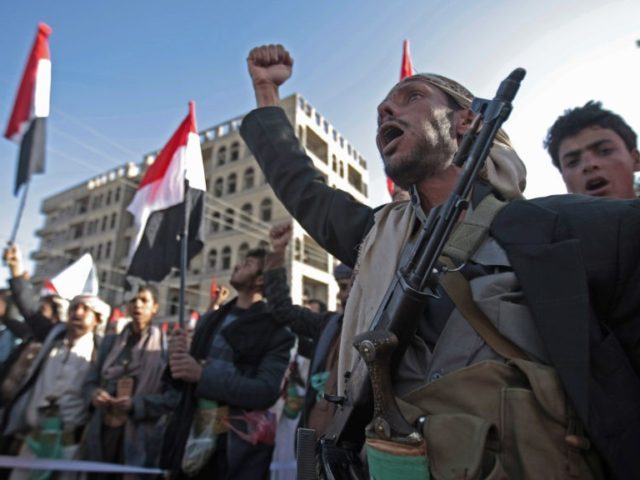The United Arab Emirates (UAE), a member of a Saudi-led coalition fighting the Iranian-backed Houthis in Yemen since 2015, revealed Tuesday that the Sunni alliance is working with the United Nations on a deal to end the war that would make peace contingent upon the Shiite rebels withdrawal from the strategically important port city of Hodeidah.
“We do want to see this come to a positive conclusion,” Reem al-Hashimi, the UAE minister of state for international cooperation, told reporters, referring to the ongoing negotiations between the Saudi-led coalition and U.N. envoy Martin Griffiths, according to Reuters.
“There are really certain elements we won’t sway from … the withdrawal of Houthis from the city is essential,” the UAE minister asserted, later suggesting that a peace deal may surface by the end of this week.
“The special envoy requires about a week or so in his conversations, those are quite delicate. Friday or Saturday this week, it comes to an end. We have continued to take a very measured and tactical approach,” she said.
Reuters learned from “Western sources” that the “Houthis have indicated they would be willing to hand over management of Hodeidah port to the United Nations, and Washington has encouraged the Arabs to accept such a deal. … However, it remains to be seen whether the Houthis could be persuaded to leave the city.”
UAE officials announced the prospective peace agreement a day after the Middle East Eye (MEE) reported on Monday that “the Houthi rebels defending Hodeidah show no signs of relinquishing control of the strategic city” despite losing the city’s airport to the fighters loyal to the internationally recognized Yemeni government, adding:
Instead, the rebels are digging in, carving out trenches to shield themselves from bombardment and placing snipers at the top of the city’s highest buildings. Meanwhile, roadblocks have been set up on the roads heading into Hodeidah and mines are being scattered across the city’s outskirts, which the Houthis hope will delay the enemy’s advance, but also risks trapping civilians in the fray. It is a situation that points towards one thing – Hodeidah is likely to be the scene of pitched street battles, a scenario dreaded by the city’s residents and international aid groups.
Since March 2015 — soon after the Houthis gained control of the Yemeni capital of Sanaa — the Saudi-led coalition, with the help of the U.S., has been fighting the Iran-allied Shiite rebels to restore the internationally recognized government of President Abd-Rabbu Mansour Hadi.
“U.N. envoy Martin Griffiths is visiting the southern city of Aden on Wednesday for talks with ousted President Abd-Rabbu Mansour Hadi in the exiled government’s temporary capital, after similar talks with the Houthis in Sanaa last week,” Reuters notes.
Dubbed the world’s worst humanitarian crisis — with millions facing starvation and disease — the three-year-old war has killed more than 10,000 people.
The UAE-led faction of the Saudi-led coalition fighting against Houthis in Hodeidah has pledged to seize Hodeidah from the Shiite rebels quickly enough to avoid interrupting aid to millions and trigger a famine.
As Yemen’s main port city that serves as the top entry point for food, aid, and military supplies, Hodeidah is the main source of revenue for the Houthis making it a prize the Saudi-led coalition cannot afford to lose, BBC reported at the beginning of the offensive to take the port city in mid-June.
“The fighting has showed some signs of abating on the ground in the last two days, residents said, despite the Houthis firing missiles at the Saudi capital Riyadh on Sunday. They have threatened more attacks in response to the Hodeidah offensive,” Reuters notes.
U.N. officials and several aid groups fear the battle for the port could escalate the world’s worst humanitarian crisis, choking off the delivery of urgently needed assistance and triggering a famine that would imperil millions of lives.
According to the U.N., the fighting in Hodeidah has displaced about 5,200 families, or around 26,000 people, noting that the number is expected to increase as the battle intensifies.

COMMENTS
Please let us know if you're having issues with commenting.